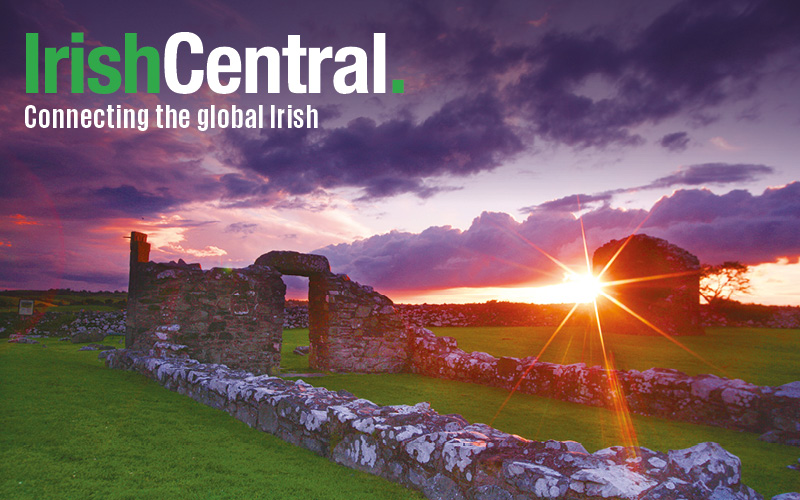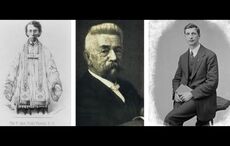I first met author, ex-priest and anti-war activist James Carroll in 1997 when he came to the Free Library of Philadelphia to read from his book An American Requiem, God, My Father, and the War That Came Between Us—winner of the National Book Award. This intensely personal powerful memoir is also a poignant reflection on the Vietnam War and how it tore his family apart and divided the country. “It was the Vietnam War that made it impossible for me to continue being a priest” he confessed in a Q & A session with the audience.
Carroll began his reading by dedicating his talk to Philip Berrigan “who is now sitting in a federal prison in Portland, Maine facing a possible 16 year jail sentence for destroying nuclear warheads.” Minutes before we chatted backstage about the Trappist monk Thomas Merton since Carroll was the recipient of the first Thomas Merton Award from Pittsburg’s Thomas Merton Center for his writing on religion and politics. I suggested that Merton may have been murdered by the Church rather than being accidentally electrocuted in Bangkok as was reported—an idea he politely considered.
Fast forward to December 2014 at the Sofitel Hotel in downtown Philadelphia for a photo shoot with James Carroll who was coming again to the Free Library that evening to read from his most recent book Christ Actually, The Son of God for the Secular Age , Viking 352 pp. $30.
Carroll, an award-winning author, poet, playwright, op-ed columnist for The Boston Globe and distinguished scholar-in-residence at Suffolk University in Boston is a deeply thoughtful, intimate and engaging man. Greeting him as he stepped off the elevator into the hotel lobby, I felt the years slip away. He was warm and relaxed saying “I really looked forward to seeing you again.”
But that is what is so disarming about him—his genuine interest in others. My initial impression hadn’t changed. He was just as I remembered. Someone with whom --if there only was time—you could sit down and talk to for hours.
In his latest book Christ Actually… Carroll points out that the anti-Semitism that began with the destruction of the Temple in 70 A.D. resulted in two sects: rabbinic Judaism and Christianity. He calls the Roman War against the Jews which lasted until approximately 135 A.D. the “first Holocaust” and suggests that the gospels written during this time long after Jesus died, and with the Roman War raging, contain scriptural inaccuracies and often biased subjective interpretations.
Consequently, Jesus was pitted against his own people—the Jews—and his essential Jewishness was forgotten ; and he was murdered by the Jews, when the truth is that he was crucified by the Romans and a willing Pontius Pilate—not the Governor of Rome reluctant to condemn Jesus as portrayed in the Gospel.
Finally, in a daring and bold sweep of history, Carroll posits that the anti-Semitism that morphed into racial hatred of Jews after the 4th century created the ideal climate for the holocausts of Auschwitz and Hiroshima to happen and flourish --an interesting connection—and if anything, Carroll takes risks when arguing a point. Yet, I found the most compelling truth of Christ Actually… is his recurring refrain that Jesus was a Jew until the very end and that until we grasp this we cannot know Jesus the man.
Usually, I avoid author readings, but James Carroll is a riveting public speaker. In his December 2014 reading of Christ Actually at the Free Library he opened with, “ I can’t breathe, hands-up, don’t shoot, Black Lives Matter” , referencing the targeting of unarmed black men by police and the racial tension and intolerance that still exists today---tracing its roots to the intense hatred and discrimination of Jews in biblical times.
A devout Catholic allied with the Second Vatican Council, he is the second of five sons of late Air Force General Joseph Carroll and his wife Mary. He was born in Chicago, Illinois and raised in Washington, D.C. and in Wiesbaden, Germany. He attended Georgetown University before entering St. Paul’s College and the Paulist seminary and was ordained to the priesthood in 1969. After serving as Catholic chaplain at Boston University from 1969 to 1974, he left the priesthood to become a writer.
Recently, we spoke and I could not help mentioning An American Requiem, which I first read in 1997—and loved all over again.
SC There are so many revelations in Christ Actually... until I read it, I also thought Jesus was put to death by the Jews ---and that is wrong
JC It is not only wrong; it is lethal down through the years. That is why the Second Vatican Council’s exoneration of Jews from the killing of Christ was the most revolutionary thing that has ever happened in the Church. The bishops, even if they were not aware of it, had all been through the Holocaust period and the Holocaust was the great revelation of where the Christ killer charge led. When the Pope told the Council that they would have to take up the question of the Church’s relationship to the Jewish people they all somehow got it that the Church had failed the Jewish people
SC I also thought that Pontius Pilate was forced by the mobs to send Jesus to his death and was reluctant to condemn Him
JC The gospel portrait of Pilate is not accurate as historians are pretty clear about now. Pilate was a petty tyrant who would have thought nothing of sending a troublemaking Galilean to his death. In fact, not long after the death of Jesus, Rome removed Pilate as Governor of Palestine because he was too brutal
SC The Holocaust seems so personal to you—why is that?
JC I stumbled into the seminary in the 1960’s just when these issues were coming to a head, I read books like The Diary of Anne Frank and Night by Elie Wiesel and there was also the trial of Adolf Eichmann; all the great reckonings about the Holocaust came about just when I was required to take them in when I was a young seminarian
SC Since 2001, the themes of your books have been religion and war, why do you think these subjects have such a hold over you?
JC Well, I am a religious man and I am also the son of a soldier; so reckoning with the war came naturally to me during the war in Vietnam. The two most important institutions in my life are America and the Church
SC Was Pope Pius X11 sympathetic to Hitler or did he make a deal with Hitler?
JC His critics portray him as if he were friendly with Hitler which is not true. He was detached from what faced the Jews and he didn’t regard the Jews as within the circle of the Church’s concern. So he took no specific public action in defense of the Jews
SC You say that your own personal reckoning with the Holocaust was spurred by Dietrich Bonhoeffer the Lutheran theologian in your book who was executed for participating in a plot to kill Hitler—do you consider him to be a religious martyr?
JC That is an excellent term for him. He was a martyr-- a Lutheran pastor who really understood the challenge that the Holocaust represented for the Church
SC In An American Requiem,.. you mention your family’s audience with Pope John XX111 who grabbed you aside and spoke to you. What was that like?
JC It was great---he put his arm on my shoulder and his mouth to my ear and spoke to me in very intimate tones. I have no idea what he said. I am not sure if it was in Latin or Italian. It was a transforming moment. As a result of that encounter, I think it was what led me to go into the seminary
SC You said that you have been working all these years to protect your faith and rescue your love for your country—has this been difficult?
JC It has been a challenge. The United States of America keeps stumbling into war and catastrophes and the Church, obviously has taken some terrible turns the last few decades –--not the least of which is the Catholic priest sex abuse scandal. But, for me the biggest challenge is the Church’s built-in contempt for the Jewish people. And we are not finished with that. And every Holy Week Christians and Catholics go to Church and they hear the same texts read in which the death of Jesus is blamed on the Jews. And preachers never help people understand why we should not take those texts literally as history and why they came to be written as they were written. We should hear those texts as if we ourselves are Jews
SC What is at the root of this discrimination towards Jews?
JC This can be traced back to what I describe in Christ Actually.., as the First Holocaust the Roman massacre of the Jews and the destruction of the Temple which resulted in two groups of surviving Jews who argued between each other about what it meant to be a Jew. One group said God is in the Temple—these were the rabbinic Jews and the other group said God is in scripture—these Jews became Christians.
SC You lived in Germany as a teenager; the Holocaust was a recent memory. That must have made a big impression on you
JC It certainly did. Everyone I met wanted to make it clear that they disapproved of Hitler and I wondered about that. It was clear that the Germans were avoiding responsibility for what happened. But I did not understand that that was true of the Church too. The Church was avoiding its own responsibility
SC Regarding the pardon of the Jews by John XXIII, did Pope John XXIII initiate it or was he approached by Jewish clerics?
JC Jewish leaders had participated with Christian leaders after the war in the so called Jewish Christian dialogue beginning in the late 1940’s through the 1950’s. There was one Jewish historian in particular----his name was Jules Isaac who wrote a book called Jesus and Israel; this was a book that really detected the origins of anti-Semitism in the gospels themselves. Pope John XXIII read it and invited Jules Isaac to come to the Vatican. Afterwards, Jules Isaac said that the Pope had told him that his book was important to him. This was the beginning of the Pope’s reckoning with this history.
SC Obviously Vatican II impacted your thinking as a priest. Can you tell me how
JC Yes, it changed the way I thought of the Church. I thought the Church was a hierarchy with the Pope at the top of the pyramid and the bishops at the second level and the priests below that. What the Vatican Council said was that the Church is the people--- not a pyramid. And that the Church is the people of God. It is not a hierarchal organization. And that the Holy Spirit lives not just in the teachers but in everybody. That meant that the Church has to take its beliefs not just from what the Pope and bishops say but from the experience of the Catholic people
SC That seems to be what is coming back now---the Church is the people
JC Yes, it is---particularly with Pope Francis. I think he has made great strides already
SC You are a devout Catholic, yet you disagree with the Church on many issues such as the acceptance of gays, ordaining women priests, allowing divorced Catholics to receive Communion, the use of contraceptives and the practice of birth control
JC I wouldn’t describe myself as a devout Catholic but I am a practicing Catholic.. and yes, there are many unresolved issues but Pope Francis says that we shouldn’t put these issues first and that they are not the most important things—that much more important is what we are doing about the poor—and what are we doing for peace
SC You said that the institutional Church is dead in Europe, do you think it is dead in America?
JC No, the Church is quite lively in the United States for various reasons—I don’t know why. America is a church going nation and I think that is good and that we can be a source of renewal for all religions—Jewish, Christian and Muslim
SC Do you think boundaries should be removed from all religions?
JC I think boundaries should be understood in a new way; that they don’t separate us as human beings even as they define us as individuals. I am an Irish Catholic and I am not interested in losing that identity but I don’t think being an Irish Catholic separates me as a human being from someone who is Muslim or Buddhist. I think the most important things are the things we all have in common with each other. So, the boundaries are not the most important things
SC What do you think of your early teaching as a Catholic schoolboy that being Catholic is the one true religion?
JC That was the old theological teaching that outside of the Catholic Church there was no salvation. When Catholics began to experience non-Catholics as fellow intelligent beings and intermarrying and living next door to them and being in the workplace with them—then it became impossible to believe that God was condemning to hell my neighbor, my wife or my child just because he or she was not Catholic.
SC You talk about the primacy of conscience as affirmed by the Second Vatican Council –why is this being ignored now—particularly with nuns like Sister Simone Campbell and the dissident priests like Roy Bourgeois, Tony Flannery and Helmut Schuller –all committed Catholics who are motivated primarily by their conscience?
JC Because it was a hard teaching for many conservatives—especially bishops-- to accept and for several decades they have pushed back against it. The Catholic laity has taken the lead on this; that is why the majority of Catholic people practice birth control even though the bishops tell them they shouldn’t. And they still go to communion—that is because they put conscience above their obligation to obey the bishops
SC As a practicing committed Catholic you think critically and come to your own conclusions—is this because of your training?
JC Well, it took a long time for me to come to it but I realize my obligation is to consider what I am taught and consider what the scholars say and then come to some conclusions of my own. Some people ask me ‘how can you say that?’ and my answer is “I say that because this is what I think.” We all have a responsibility to do that
SC Did writing An American Requiem offer any closure in regards to your relationship with your father?
JC Well, I have to admit that the wound of what went on between me and my father never healed
SC Your parents were of the era of very traditional Catholicism-- what would they think of Pope Francis?
JC My parents, like other people who lived in that time could not have imagined a Church defined by Pope Francis; I would hope that they would recognize the basic goodness of what he represents
SC Do you think the anti-war movement should be mobilized again like it was during the Vietnam War?
JC Yes, I do, especially on the issue of nuclear disarmament
SC Do you think the bishops have a mandate to oppose the war?
JC Absolutely and I think the Pope is making that clear; he was just in Sri Lanka pleading for peace quoting Pope Paul V1 saying “No More War”
SC Are there any just wars?
JC In the nuclear age, I would say no because war opens up the possibility of using weapons of mass destruction and that is what makes this period different. If we keep resolving conflicts with violence, ultimately we will use these horrible weapons that will bring about the end of our culture—so we have to stop—that is my strong feeling




Comments